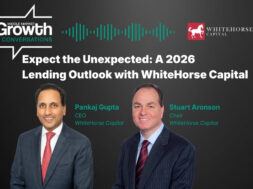Healthcare Private Equity Investors Tackle Regulatory Challenges
How private equity investors active in the healthcare industry are responding to government inquiries on rollups

Private equity has come out fighting against the U.S. Department of Justice (DOJ), Department of Health and Human Services (HHS) and the Federal Trade Commission (FTC) as the collective agencies continue to look for ways to limit private equity’s ability to invest in the healthcare industry—despite a Texas court dismissing the FTC’s case against Welsh Carson Anderson & Stowe that had been brought in September 2023.
The FTC sued U.S. Anesthesia Partners Inc. (USAP), a Dallas-based anesthesiology practice, and its private equity sponsor, Welsh Carson, alleging that USAP and Welsh Carson engaged in a decade-long anticompetitive acquisition spree to cut options and drive up costs for consumers.
Since the ruling, the agencies have collectively put out a Request for Information (RFI) on Consolidation in Health Care Markets, which seeks public comment on transactions involving health care providers. The agencies also put out a RFI on roll-up strategies and serial acquisitions across the U.S. economy.
“Firms can use serial acquisitions to roll up markets, consolidate power, and undermine fair competition, all while jacking up prices and degrading quality,” said Chair Lina M. Khan in a press release. “As the FTC scrutinizes these stealth consolidation schemes, we invite the public to submit information about where serial acquisitions have occurred and their effects.”
Regulators, PE Firms at Odds
In July, The FTC and DOJ extended the public comment period to September 20 for information targeting serial acquisitions and roll-up strategies. The agencies are hoping to identify serial acquisitions and roll-up strategies throughout the economy that have led to consolidation that the agency believes harms competition.
The agencies are hoping to stop private equity firms from amassing significant control over key products, services or labor markets without government scrutiny. “These types of transactions can harm competition to the detriment of consumers, workers, and innovation across an entire industry or business sector,” according to the FTC.
Dealmakers worry the continued scrutiny will be a turn off to dealmakers and ultimately lead to less investment dollars. “Firms may think twice or stop looking at patient facing healthcare deals altogether if this continues. Why subject yourself to the scrutiny?” says Pam Hendrickson, a vice chairman with private equity firm The Riverside Company and chair of the American Investment Council’s (AIC) board of directors.
Despite growing attention from regulators and the media, the number of healthcare providers owned by private equity firms is relatively small, a report from market analytics firm PitchBook found.
According to the data, providers backed by private equity make up only 3.3% of the total market by revenue. Further, the number of hospitals and provider groups backed by private equity has slowed over the past six years, with the number of new healthcare organizations backed by private equity failing to grow 1% in the first quarter of 2024.
Barbara Sicalides, a partner with law firm Troutman Pepper who focuses on antitrust and competition matters, says the concern with the agencies’ inquiries is the characterization that private equity buyers are all the same and look to deceive the public. “There appears to be an underlying bias that assumes that private equity buyers that are considering a roll-up strategy are harmful to healthcare and greed alone is their driving motivation. In my experience, that is a fundamental misunderstanding,” she argues.
Additionally, Sicalides notes that there’s really nothing “stealth” about private equity deals as the agencies suggest in their call for comments, which implies the deals are intentionally done under the radar. “They assume serial acquisitions are done to hide a strategy, but almost every private equity firm issues a press release on their deals. And private equity firms typically list their portfolio holding on their websites. It’s public information. It’s wrong to suggest anything different.”
PE Decries a ‘One-Sided Narrative’
In rebuttal to the agencies’ Requests for Information, the AIC in June issued a public letter to the DOJ expressing its concern that the agencies are unfairly targeting private equity investments in the healthcare industry based on anecdotal observations.
“Without private equity investments, many healthcare businesses would face difficulties accessing capital and expertise to support their innovation, enhanced service delivery and patient outcomes,” the letter states, adding claims that the RFI’s concerns over PE investment in healthcare are “unsubstantiated” and offer a “one-sided narrative that wrongly portrays private equity investments in the healthcare industry as bad for patients.”
Dealmakers and their partners who spoke with Middle Market Growth agree that regulators’ RFI suggests an imbalanced viewpoint on the matter.
“The FTC is not known for its balance. That’s why they weren’t successful against Welsh Carson,” says Hendrickson. “They shouldn’t be looking to penalize us as an industry for the work we do. We need a symphony of voices shouting that we support small businesses. Let’s suppose a doctor has built a practice and wants to retire. How will he monetize his life’s work if someone doesn’t buy him out? Why is it a bad thing for private equity to step in?”
Sicalides agrees that the FTC’s RFI “does not appear to want to get a broader perspective of opinions.”
“The agencies also don’t take into account the market realities,” she says. “If you are not providing a good service or your rates are out of control, private equity firms will not maximize their opportunities to sell their investments when the time comes. Physicians, private equity-backed or not, will not succeed or be sought after by health insurers if they are not providing quality care.”
The agencies also don’t take into account the market realities. If you are not providing a good service or your rates are out of control, private equity firms will not maximize their opportunities to sell their investments when the time comes.
Barbara Sicalides
Troutman Pepper
The AIC’s 16-page letter goes on to spell out private equity’s investment in the U.S. economy, healthcare industry, hospitals, nursing facilities, urgent care centers, physician practice management and other healthcare subsectors. According to the AIC, private equity firms have nearly $73 billion of capital that is dedicated to healthcare investments today.
Going Forward
Up to this point, middle-market dealmaking hasn’t been overly impacted, but the possibility of that changing remains on dealmakers’ minds. As part of the scrutiny on healthcare deals, the HSR Act, which requires healthcare transactions valued at more than $119.5 million to make a premerger notification with the FTC and DOJ and observe a statutory waiting period (usually 30 days) before consummation, has been ramped up, according to Don Ritucci, head of healthcare M&A at investment bank Oppenheimer & Co.
Buyers and sellers now have to factor in a state-level review on some deals and it can take longer for deals to close; simultaneous sign and close deals are becoming more rare.
“In addition to an HSR Act review, enhanced scrutiny is happening more and more at the state level,” he says. “It’s the unknown that can hamper deals because it’s hard to know when you will get approvals and it’s disruptive. It makes for good headlines for politicians to say they are looking out for the little guy. But at a certain point, dealmakers will say some deals aren’t worth the headache, which will be a terrible thing for M&A.”
While right now private equity investments in healthcare remain in the spotlight, the FTC requested information on roll-ups and corporate strategies in housing, agriculture, defense, cybersecurity, distribution, construction, aftermarket repair and professional services for public comment, which means private equity firms could see the same issues arise in other sectors.
Danielle Fugazy is a freelance writer who has covered private equity for more than 20 years. She is based in Glen Cove, New York.
Middle Market Growth is produced by the Association for Corporate Growth. To learn more about the organization and how to become a member, visit www.acg.org.


